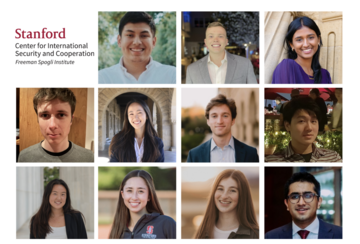News

This single-video module examines the case of Gifford Pinchot and Sustainable Forest Management. Through this case study, students will gain a better understanding of how good communication is important for persuading stakeholders that a reform objective is both achievable and beneficial.
ChatGPT and Physicians’ Malpractice Risk
In this JAMA Forum perspective, SHP's Michelle Mello, professor of health policy and of law, and Neel Guha, a Stanford Law School student and PhD candidate in computer science, write that medical advice from AI chatbots is not yet highly accurate, so physicians should only use these systems to supplement more traditional forms of medical guidance.

Depopulation is a concern shared by Japan and South Korea. Immigration of high-skilled labor could be a solution for mitigating it. In this regard, Japan SPOTLIGHT interviewed Prof. Gi-Wook Shin, who is working on a new research initiative seeking to examine the potential benefits of talent flows in the Asia-Pacific region.

On May 25, CDDRL’s Deliberative Democracy Lab (DDL), in partnership with the Nobel Prize Summit, will run an exercise in large-scale group deliberation on the subject of online misinformation and polarization and what to do about it. This demonstration will help develop the capacity to democratically vet policy proposals concerning the information landscape.
Riya Mehta (Fisher Family Honors Program class of 2017-18) is among 85 scholars in the Knight-Hennessy Scholars' sixth cohort.

From Egypt to England, the Maldives to Switzerland, Vietnam, Ghana, Kenya, and Fiji, the 2023 cohort of the Ford Dorsey Master's in International Policy has criss-crossed the world practicing their policymaking skills.
The American Society of Health Economists recognizes David Chan for his significant contributions to health economics research.

In this Q&A, Ayça Alemdaroğlu, Associate Director of the Program on Turkey at the Center on Democracy, Development and the Rule of Law, discusses the key issues and their implications for the country's future.
We are thrilled to welcome eleven outstanding students, who together represent thirteen different majors and minors, to our Honors Program in International Security Studies.

Upon completing the inventory phase of its research, the effort released a list of the courses, research and engagement activities that it feels advance democracy. The next phase involves holding deliberations with the larger Stanford community.
![U.S. Congressman Ro Khanna [center] onstage with Amy Zegart [left] and Michael McFaul [right].](https://fsi9-prod.s3.us-west-1.amazonaws.com/s3fs-public/styles/360x244/public/2023-04/ro_khanna_mcfaul_zegart_china_hero.png?h=c4d9845d&itok=fUOQnN1B)
The congressman joined Michael McFaul and Amy Zegart for a discussion co-sponsored by the Freeman Spogli Institute for International Studies and the Hoover Institution on American economic resiliency in the face of U.S. competition with China.
Biden needs South Korean support for U.S. geopolitical efforts, whereas Yoon hopes to resolve contentious domestic issues with support from Biden.
Gray Skies Ahead
Prospects for Korea’s Democracy

Faculty from across disciplines were honored by the American Academy of Arts and Sciences, recognizing their excellence and leadership in work that advances the common good.

The event, which was largely student-driven, aimed to foster dialogue on how the Stanford community can engage with Latin America.

Daphne Keller spoke with the Initiative for Digital Public Infrastructure at the University of Massachusetts Amherst about two potentially major cases currently before the Supreme Court

Conducted in partnership with CDDRL's Deliberative Democracy Lab and the UC Berkeley Goldman School of Public Policy, key findings show strong support for the state to provide universal mental healthcare, institute a strengthened high school civics course, develop a “one-stop-shop” for easier access to government programs, reform for the state’s CEQA law, and increase its support for K-12 education, among others.

A transatlantic background and a decade of experience as a lawmaker in the European Parliament has given Marietje Schaake a unique perspective as a researcher investigating the harms technology is causing to democracy and human rights.

Video Interview: Gi-Wook Shin Discusses the Economic and Geopolitical Implications of Mobile Talent
APARC and Korea Program Director Gi-Wook Shin joins Gita Wirjawan, a visiting scholar at the Center and host of the “Endgame” video podcast, to share his work on the ways in which countries in Asia and elsewhere can address brain drain, discuss the influence of soft power on South Korea's evolution, and consider the threats posed by demographic and democratic crises to the country’s future.
Reflections on an intensive course on sustainable business and social innovation.
Most Americans don’t know they may be infected with the hepatitis B virus, the leading cause of liver cancer around the world. Stanford researchers have been working with the CDC to provide evidence that screening every adult for the virus would not only be cost-effective, but could save many lives.

Stanislav Markus, Associate Professor of International Business, Joins CDDRL as Visiting Scholar
During his time at Stanford, Prof. Markus will be conducting research for his forthcoming book project, "Tycoon Politics in the Developing World."














